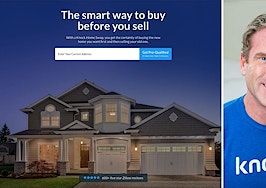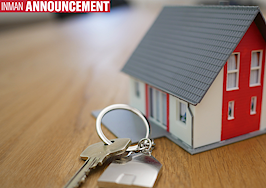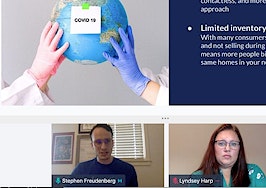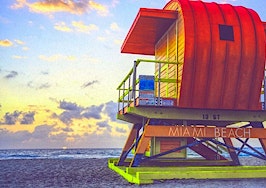Real estate technology startup Knock has officially entered the home sale-leaseback market with the launch of Knock Nest, a new product that allows homeowners to sell their home to Knock and receive an all-cash offer with a long-term lease and repurchase option.

Sean Black
“For most people, their home is their single largest asset, and over 97 percent of homeowners have positive equity in their homes,” Knock co-founder and CEO Sean Black said in a press release. “We created Knock Nest to allow homeowners to put the equity they’ve worked hard to build to work for them — whether it’s to achieve their dreams, help with life’s uncertainties, or plan for the next stage of their lives.”
Available in select Arizona, Colorado, Florida, Georgia and Texas markets, Knock Nest has a qualification process similar to Knock Home Swap. To get started, homeowners must provide their address, which gives Knock access to information about the home’s age, value, condition and other publicly available information.
From there, Knock will provide a no-obligation cash offer that includes a sale-leaseback option at market rate with a locked-in repurchase price based on projected appreciation trends. The leases renew on a 12-month basis, where homeowners are given the option of lease renewal, repurchasing, or moving to a new property.
Once homeowners accept the offer, they’re able to use the cash to pay off their mortgage and access the equity in their home within two weeks to use on other personal and financial goals. Under the Knock Nest program, sellers aren’t responsible for mortgage payments, property taxes, homeowner’s insurance or any other costs associated with homeownership.
Just like Home Swap, Knock Nest has a convenience fee of 1.25 percent, which doesn’t include commissions or closing costs.
In a phone call with Inman, Black explained Knock has done “800 sale-leaseback deals over the past couple of years” as a benefit for Knock Home Swap sellers who needed more time to chart their next move. However, his team realized the leasebacks should be a separate product.
“There are two flavors of people there that need what we have, now more than ever,” he added. “There are people who need Home Swap and [the option of] buying first, and there’s this whole other group of people who don’t know necessarily what they want to do and need Knock Nest.”
“[Leasebacks] wasn’t a separate product [and] it wasn’t a separate cost, but we realized that if we pulled it out, we could actually offer it to people who wanted flexibility,” he said. “There’s something like $20 trillion in home equity in people’s homes, and that’s only gone up because of COVID and the price appreciation and in all these markets.”
He continued, “So some people just want to sell the home while it’s at what they feel is the peak, and then have the flexibility to buy later or rent later, start a business, rebuild credit if they’re in forbearance or some other situation.”
Black said he’s confident in Knock Nest and how it stacks up to other competitors in the quickly-growing alternative financing and sale-leaseback space, including Noah, Figure, and EasyKnock.
“My co-founder and I were on the founding team of Trulia, which we now look back to that as the information revolution,” he said. “So in 2015, we like to think that we, along with Opendoor, kicked off the transaction revolution.”
“There is a wave of innovation to give people easy access to the equity they’ve earned, and move more quickly and freely without a lot of cost and uncertainty,” he added. “So I would like to think that Home Swap created the category that we’re in terms of innovating with something that’s more certain and convenient, and more liquid.”
Although Knock Nest is a new product, Black reiterated the company isn’t a newbie in the space as it’s been perfecting the leaseback process through Knock Swap — well before the launch of other options.
“There’s the fact that we’ve had this [leaseback option] built into the Home Swap for several years, and we’ve done 800 of these leasebacks, which means we’re on the forefront,” he said. “We didn’t even realize it was a separate product; we just built it as an option to make people’s lives easier when they were moving, which is what we do.”
“So, I like to think that we’re always forward-looking.”













